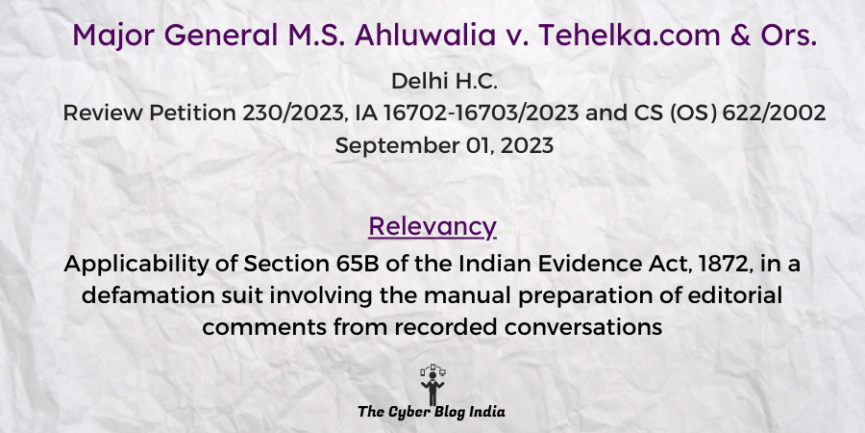Major General M.S. Ahluwalia v. Tehelka.com & Ors

Major General M.S. Ahluwalia v. Tehelka.com & Ors.
In the High Court of Delhi
Review Petition 230/2023, IA 16702-16703/2023 and CS (OS) 622/2002
Before Justice Neena Bansal Krishna
Decided on September 01, 2023
Relevancy of the case: Applicability of Section 65B of the Indian Evidence Act, 1872, in a defamation suit involving the manual preparation of editorial comments from recorded conversations
Statutes and Provisions Involved
- The Code of Civil Procedure, 1908 (Section 114, Section 151, Order XLVII Rule 1)
- The Indian Evidence Act, 1872 (Section 3, 58, 65B(4))
- The Information Technology Act, 2000 (Section 2(1)(t))
Relevant Facts of the Case
- Tehelka is a well-known name for its investigative journalism and sting operations. In the Operation West End sting operation, two of its journalists worked as representatives of a fictitious London-based defence equipment firm. They sought to introduce new defence equipment to the Indian Army and met the plaintiff eventually.
- The magazine published an article detailing the journalists’ interaction with the plaintiff. The plaintiff demanded a bribe of ₹10 lakhs, a bottle of Blue Label whiskey, and accepted a token bribe of ₹50,000.
- After the publication of this article, the CBI filed a case against the plaintiff under Sections 9 and 10 of the Prevention of Corruption Act, 1988. Subsequently, the Army Court had also court-martialled him. However, the Army Chief acquitted him and awarded ‘Severe Displeasure’ status.
- In 2002, the plaintiff lodged a defamation case against the magazine, its journalists, and the Chairman/CEO of Zee TV. Zee TV had broadcasted the string operation on its news channel.
- The defendant (review petitioner) has filed this review petition against the court’s order directing it to pay ₹2 crores as damages.
Prominent Arguments by the Advocates
- The review petitioner’s counsel argued that the oral evidence without a certificate presented by the respondent would not be sufficient as per Section 65B of the Indian Evidence Act, 1872.
Opinion of the Bench
- A party can only file a review petition in case of factual mistakes. A court will not entertain review applications to correct the observations made during the judgment.
- Section 65B of the Indian Evidence Act, 1872, is not valid in the given case. The second petitioner had manually written the entire transcript and editorial remarks. Hence, they are not electronically generated.
- The court would consider it as a mere document and not electronic evidence. The petitioners have not questioned the authenticity; therefore, it is admissible in the court.
- The Army Court had acquitted the plaintiff and only awarded “Severe Displeasure” for his conduct. It was not for accepting money, as alleged in the editorial comments. The petitioners could not highlight the mistake that could be corrected within the ambit of review but instead argued about the authenticity of the transcripts.
- Defamation law is not against media publications. However, if not done in good faith, it may lead to defamation because the cause of public excellent and fair comment will not justify an untrue statement.
Final Decision
- The bench dismissed the review petition.
